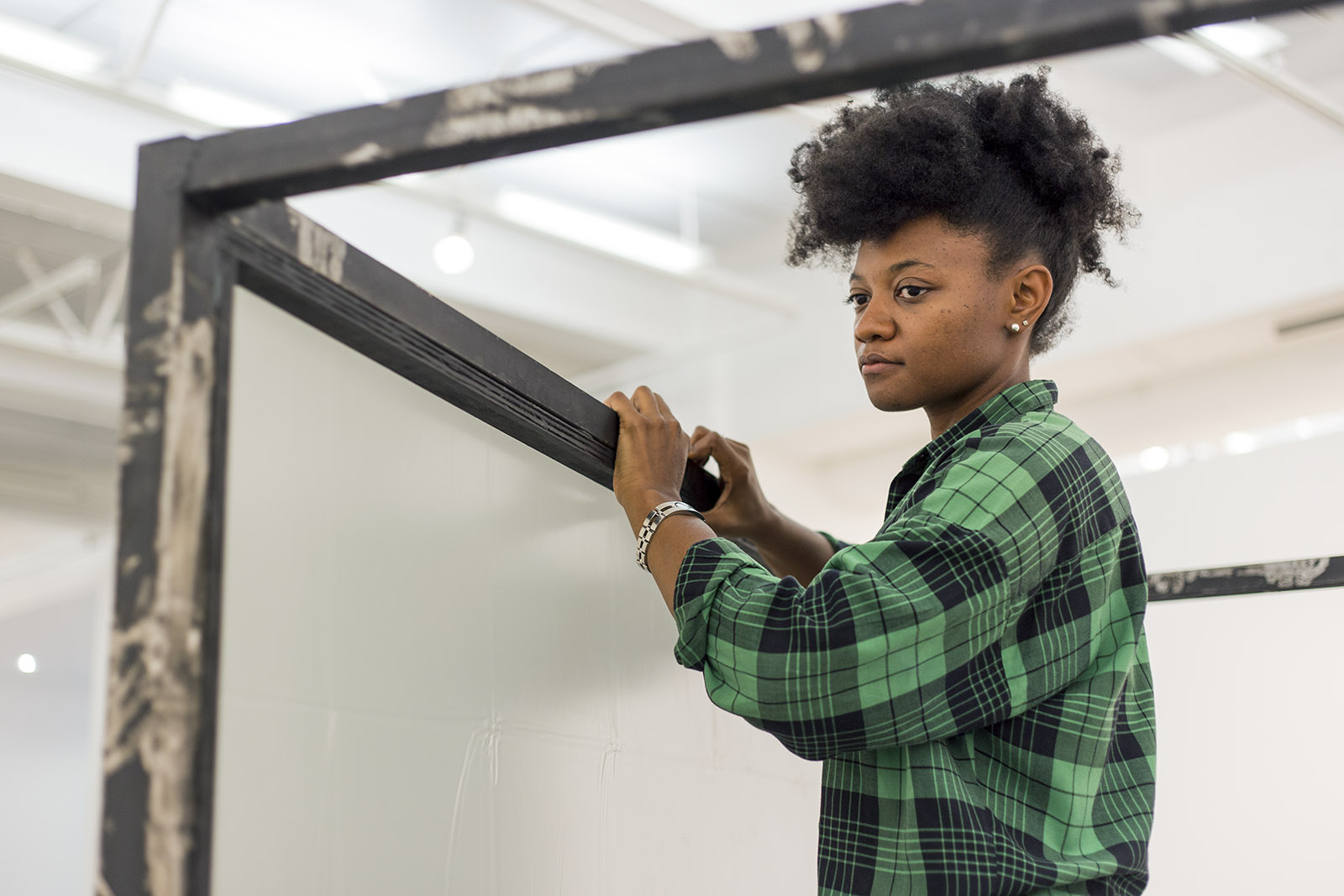Graduate art student explores intersections of human, technology

New genres graduate student Nikita Gale created her masters’ thesis based off her experiences with cars, technology and human interaction. Gale, along with two other graduate students, will exhibit her work Thursday at the New Wight Gallery. (Jennifer Hu/Daily Bruin)
By Kayla Hausmann
April 14, 2016 12:00 a.m.
Nikita Gale and her then-girlfriend’s voices rose in pitch and anticipation as they sat parked in front of a gas station in late spring 2015 weighing the pros and cons of abandoning weekend plans in Joshua Tree and driving to Vegas to get married.
As they spoke, Gale’s iPhone recorded their 10-minute conversation. A video of a Google Maps app, which navigates through the places they spoke about, is now the centerpiece of Gale’s graduate thesis.
Gale said the interconnected relationships with people and technology, like her usage of Google Maps in her car, led to the creation and development of her fine arts graduate thesis work. She and two other graduate students’ works will be featured in an exhibition opening Thursday at the New Wight Gallery on campus. Gale said her observations of people and cars influenced her to create works examining themes of control in interactions between humans and technology.
She said the recording from her car reveals a loss of control as the two speak idealistically about their idea, losing sight of reason.
“There’s a moment in the conversation … where there’s this kind of excitement, where you get the sense that there is some kind of relinquishing of control happening,” Gale said.
Yet as the recording goes on, the two voices gradually become calm again, restoring order as they make a logical decision to follow their original plan of spending the weekend in Joshua Tree.
Gale said because she and her then-girlfriend were in a long distance relationship, each time the two spent time together she recorded their interactions on her iPhone. The sense of control she felt in using technology to capture those intimate conversations channeled the anxiety she felt about the long distance separating them.
“There’s a kind of distance that occurs where you may be presently experiencing something, but the fact that you’re recording also (shows) a desire to kind of analyze or look back at this footage in a separate place and time,” Gale said.
Initially she did not envision the recording becoming the centerpiece of her thesis, having begun her research studying emotions of desire after recalling her own fascination in high school with a BMW Z3 coup.
“I (started) thinking a lot about what it was sort of about the car, why I had such a strong, almost visceral reaction to seeing the image of that car,” she said.
Gale found cars reliable and simple: If a car stops working, it is either replaced or repaired. She noted humanity’s complete control over machinery.
Her understanding of control was further shaped by a theory she learned in a course with art professor Andrea Fraser. Gale said desire to control stems from anxiety about a potential loss or from finding pleasure in control.
She found Fraser’s idea compelling with regards to technology and dynamics of control in interpersonal relationships, and was reminded of an unexpected connection in heavy traffic along her daily commute to UCLA.
Gale slowed as she approached a red light at Pico Avenue and Beverly Glen Boulevard. As her car rolled gently to a stop, she turned her head to see a woman sitting next to her in an SUV. The woman glanced out her window, locking eyes with Gale, and smiled a warm, friendly smile.
Surprised by the genuine human connection, a rare occurrence in the daily scramble of traffic, Gale said she smiled in return. After a moment the light turned green and the two cars resumed their isolated commute.
“I think it sort of signified a kind of break or moment where we were an exception to this idea of technology as a kind of isolating force, or the idea of traffic as being private,” Gale said.
These experiences with privacy and human conversation became important to Gale’s work when she became immersed in the graduate community after moving from Atlanta.
Gale missed the intellectual camaraderie of universities in her isolated Atlanta studio, but when she came to UCLA, she said she felt like she was a part of a community. Her peers and instructors, who constantly came into the studios, would have conversations with her about her works and their progress.
Barbara Kruger, a new genres professor and a member of Gale’s thesis committee, said the faculty encourages students to think critically about cultural constructions and constraints within their artwork.
“Nikita was a really extraordinarily terrific young artist,” Kruger said. “She tries to show and tell what it means to live in this time.”
Gale said the support of a community of professors like Kruger has helped her grow as an artist while exploring control, intimacy and technology in her own life over the past two years.
“I don’t think the work would be as robust or developed had I not been in this kind of environment where I’m having these conversations with these really amazing artists and faculty members,” Gale said.


